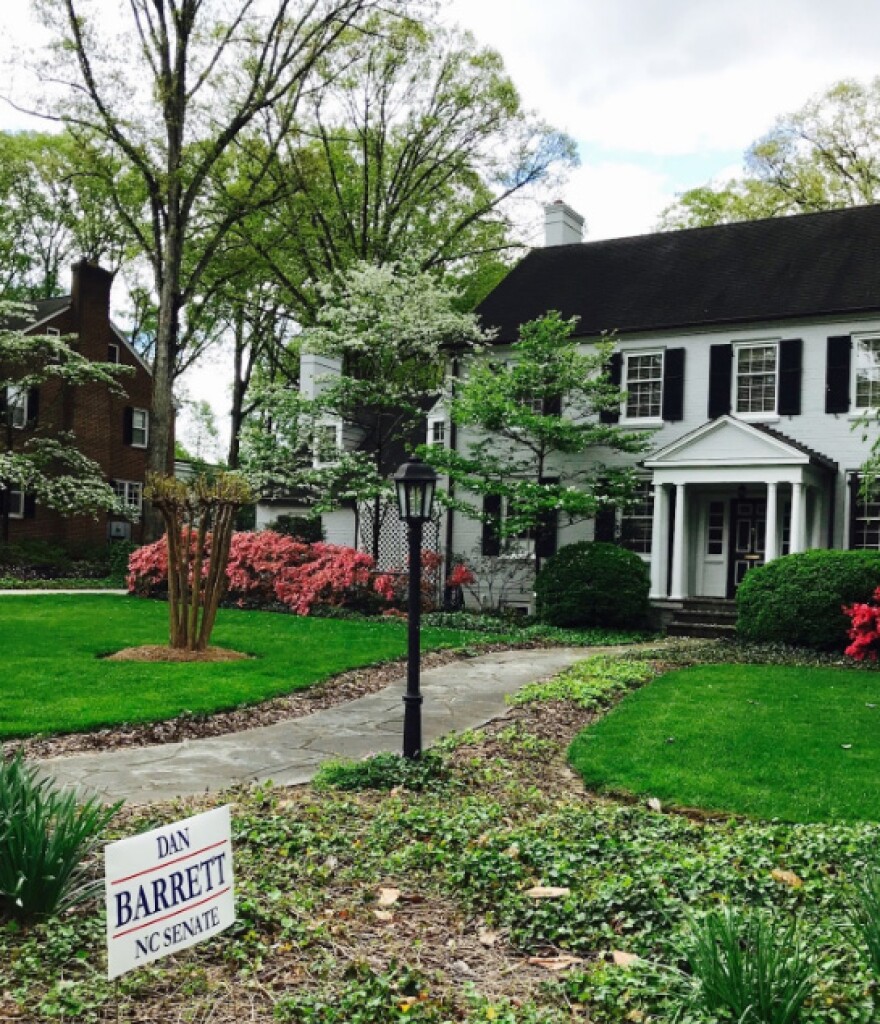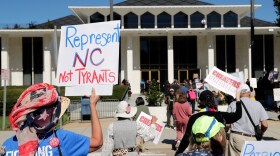If history is any indicator, turnout for the North Carolina primary on May 8th may be low, especially with no glitzy federal or statewide candidates on the ballot—fewer than 8 percent of voters cast a ballot in 2016. But this year may be different. The races highlight one of the biggest political stories of 2017: our state’s election maps.
Charges of illegal racial gerrymandering, and the redrawn electoral lines that resulted, are playing out in one small district in the Piedmont region of North Carolina. That’s where two Republican incumbent senators are “double-bunked,” forcing them to face off against each other for one vacant seat. In all, nine North Carolina state senate districts were affected by the redrawn legislative district, with the new map pairing Republican incumbents in three of them.
So, how do these two conservative candidates differentiate themselves, and who will reign supreme? The answers to those questions hold interesting implications for the GOP and both state senators as they crisscross their newly drawn district in search of votes.
State Senators Joyce Krawiec, a small business owner, and lawyer Daniel Barrett are competing in District 31, encompassing rural Davie County and portions of Forsyth County, which is home to both the city of Winston-Salem and its surrounding suburban areas. Both candidates are known for hard work, wanting to make a difference in people’s lives, and it shows among their constituents.

Rick Price is a lawyer who lives in the affluent Buena Vista neighborhood of Winston-Salem: manicured lawns, and stately homes line the quiet streets. It’s just a few minutes from downtown, and one of the wealthiest areas of the city. Price has known Senator Barrett for years, and considers him a friend.
“Dan’s just got a good head on his shoulders,” says Price. “He’s a good thinker and a good decision-maker. He has a rational way of approaching issues, and generally comes to the right result. I just think Dan would be the right man for the job.”
Heading a few miles west toward the more rural village of Clemmons, Senator Krawiec supporter Linda Petrou pauses from her outdoor gardening on this quiet street to cheer for the woman she’s admired for two decades.
“She is somebody that seeks out answers to problems with solutions that don’t cost a lot of money,” says Petrou. “She’s hard-working. I mean they call her the hardest-working senator down there. She’s on committees and chairs committees. But she feels she took on that responsibility and she’s going to handle it.”
Both state senators have strong conservative credentials. Prior to her appointment to the chamber in 2014, Krawiec was well known in Republican circles for her activism with the state party, Federation of Republican Women, Freedom Works and others. Barrett was appointed in 2017, after serving for years as Davie County Commissioner, chairing the 5th Congressional District Republican Party, and working for the state party.
Taken altogether, there’s not a lot of daylight between these two candidates in terms of their political philosophies. Both agree that their best ideas and legislative initiatives have come from constituents. And working to provide affordable and accessible healthcare tops their lists of professional goals.
Forsyth County GOP Chair Brian Miller says it’s a sad shame that one of these two honest, hard-working people will not be in the state senate next year. He says he sees some irony in the gerrymandering charges leveled against the GOP given that the same practice was in effect for 150 years under state democratic control.
“All of a sudden when the Republican philosophy has taken center stage, the Democrats are fighting back,” he says. “And it doesn’t matter what you do with redistricting. It’s never acceptable.”
Catawba College Professor of Politics Michael Bitzer says political parties on both sides recognize the power of incumbency, and try to avoid double-bunking at all costs.
“But it’s not just legislators drawing the lines. It’s outsiders, particularly the courts, having to draw these lines,” says Bitzer. “And the courts really aren’t worried necessarily about protecting incumbents, protecting majority party candidates. And in particular, if they see a district that lines up with the fact that there are now two sitting incumbents, double-bunking those folks, that’s okay to the courts.”
The redrawn lines are impacting the race in other ways as well. While Senator Barrett may enjoy strong support among his rural Davie County constituents, he’ll now have to compete in the more populous western Forsyth County suburbs where Senator Krawiec has been well known for years. Bitzer says there’s an interesting dynamic playing out across the state with deep red rural constituents, and even more Republican-leaning suburban voters.
“Both of these candidates are kind of drawing on different constituencies,” he says. “I think the key—as it always is in any election—is going to be who shows up. And what these candidates have to do is to figure out where their base of supporters are, where they have high name recognition, and simply pound the pavement, or flood the airwaves.”

Davie County GOP Chair Jon Welborn acknowledges that it will be an uphill battle for Barrett.
“Dan has some great grassroots support,” says Welborn. “I think he’s got boots on the ground and people willing to come out and support him. But at the end of the day, sometimes campaigns boil down to who’s got the most PAC money. Who’s got the most connections in Raleigh? Who’s got the biggest ability to run commercials on TV? And I think Joyce has a strong advantage in that regard.”
For State Senator Barrett—who once campaigned for governor by walking across the length of North Carolina from the mountains to the Outer Banks—the path is clear.
“I just focus on what I bring to the party,” Barrett says. “I’m the only candidate in this race deeply rooted in both Forsyth and Davie counties. I went to Wake Forest undergrad, went to Wake Forest law school, practiced law in Forsyth County for 32 years, but my home is in Davie. And that’s where I’ve worked a lot in the community. What I want to be as a senator is one who partners with our local communities, helps them where I can help them, builds relationships, understands their needs, listens to citizens, and does what is best for the citizens I represent.”
For State Senator Krawiec, it’s experience, not geography that she hopes will hold the most sway with voters.
“I know my opponent Senator Barrett also says he wants to focus on healthcare,” Krawiec says. “Well, I’m chair of the healthcare committee, and I’m also chair of health appropriations. I write the budget for health. So, I certainly have more of an opportunity to affect legislation [and] affect healthcare than I believe he will.”
While the primary outcome is anything but certain, one thing is clear: Republican Senate District 31 isn’t big enough for the both of them.








